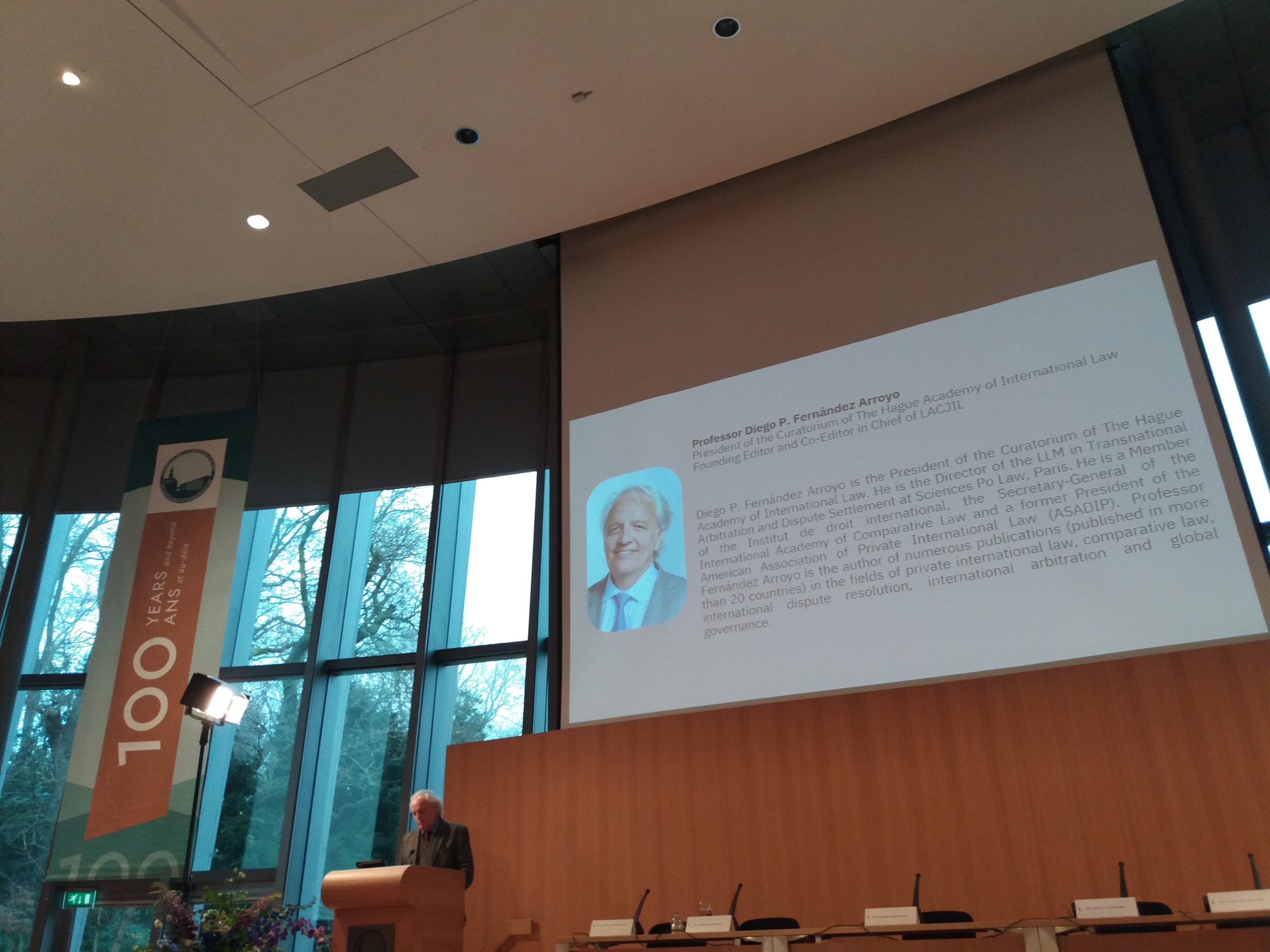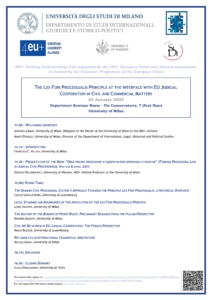Views
The long tentacles of the Helms-Burton Act in Europe (III)
Written by Nicolás Zambrana-Tévar LLM(LSE) PhD(Navarra), Associate Professor KIMEP University (Kazakhstan), n.zambrana@kimep.kz
There has recently been a new and disappointing development in the saga of the Sánchez-Hill, a Spanish-Cuban-US family who filed a lawsuit before Spanish courts against a Spanish Hotel company (Meliá Hotels) for unjust enrichment. Meliá is exploiting several hotels located on land owned by Gaviota S.A., a Cuban company owned by the Republic of Cuba. That land was expropriated by Cuba without compensation, following the revolution of 1959.
Read more
Choice of Law in the American Courts in 2022: Thirty-Sixth Annual Survey
The 36th Annual Survey of Choice of Law in the American Courts (2022) has been posted to SSRN.
The cases discussed in this year’s survey cover such topics as: (1) choice of law, (2) party autonomy, (3) extraterritoriality, (4) international human rights, (5) foreign sovereign immunity, (6) foreign official immunity, (7) adjudicative jurisdiction, and (8) the recognition and enforcement of foreign judgments. Happy reading!
John Coyle (University of North Carolina School of Law)
William Dodge (University of California, Davis School of Law)
Aaron Simowitz (Willamette University College of Law)
Book: Intolerant Justice: Conflict and Cooperation on Transnational Litigation by Asif Efrat
Summary provided by the author, Asif Efrat
In a globalized world, legal cases that come before domestic courts are often transnational, that is, they involve foreign elements. For example, the case before the court may revolve around events, activities, or situations that occurred in a foreign country, or the case may involve foreign parties or the application of foreign law. Such cases typically present an overlap between the legal authorities of two countries. To handle a transnational case cooperatively, one legal system must cede its authority over the case, in full or in part, to a foreign legal system. This effectively means that a local citizen would be subjected to the laws or jurisdiction of a foreign legal authority, and that raises a host of questions and concerns: Does the foreign legal system abide by the rule of law? Does it guarantee human rights? Will the foreign court grant our citizen the due process and fair treatment they would have enjoyed at home?
The newly published book Intolerant Justice: Conflict and Cooperation on Transnational Litigation (Oxford University Press) argues that the human disposition of ethnocentrism – the tendency to divide the world into superior in-groups and inferior out-groups – would often lead policymakers to answer these questions negatively. The ethnocentric, who fears anything foreign, will often view the foreign legal system as falling below the home country’s standards and, therefore, as unfair or even dangerous. Understandably, such a view would make cooperation more difficult to establish. It would be harder to relinquish the jurisdiction over legal cases to a foreign system if the latter is seen as unfair; extraditing an alleged offender to stand trial abroad would seem unjust; and the local enforcement of foreign judgements could be perceived as an affront to legal sovereignty that contravenes fundamental norms.
This book examines who expresses such ethnocentric views and how they frame them; and, on the other hand, who seeks to dispel these concerns and establish cooperation between legal systems. In other words, the domestic political debate over transnational litigation stands at the center of this book.
In this debate, the book shows, some domestic actors are particularly likely to oppose cooperation on ethnocentric grounds: the government’s political opponents may portray the government’s willingness to cooperate as a dangerous surrender to a foreign legal system, which undermines local values and threatens the home country’s citizens; NGOs concerned for human rights might fear the human-rights consequences of cooperation with a foreign legal system; and lawyers, steeped in local rules and procedures, may take pride in their legal system and reject foreign rules and procedures as wrong or inferior.
By contrast, actors within the state apparatus typically view cooperation on litigation more favorably. Jurists who belong to the state – such as judges, prosecutors, and the justice-ministry bureaucracy – may support cooperation out of a concern for reciprocity or based on the principled belief that offenders should not escape responsibility by crossing national borders. The ministry of foreign affairs and the ministry of defense may similarly support cooperation on litigation that could yield diplomatic or security benefits. These proponents of cooperation typically argue that legal differences among countries should be respected or that adequate safeguards can guarantee fair treatment by foreign legal authorities. In some cases, these arguments prevail and cooperation on litigation is established; in other cases, the ethnocentric sentiments end up weakening or scuttling the cooperative efforts.
These political controversies are examined through a set of rich case studies, including the Congressional debate over the criminal prosecution of U.S. troops in NATO countries, the British concerns over extradition to the United States and EU members, the dilemma of extradition to China, the wariness toward U.S. civil judgments in European courts, the U.S.-British divide over libel cases, and the concern about returning abducted children to countries with a questionable human rights record.
Overall, this book offers a useful analytical framework for thinking about the tensions arising from transnational litigation and conflict of laws. This book draws our attention to the political arena, where litigation-related statutes and treaties are crafted, oftentimes against fierce resistance. Yet the insights offered here may also be used for analyzing judicial attitudes and decisions in transnational cases. This book will be of interest to anyone seeking to understand the challenges of establishing cooperation among legal systems.
News
The Latin American and Caribbean Journal of International Law (LACJIL) has been launched

Today the Latin American and Caribbean Journal of International Law (LACJIL) was launched at the auditorium of the Hague Academy of the Peace Palace. Among the speakers were Prof. Diego Fernández Arroyo, president of the curatorium of the Hague Academy, and H.E. Leonardo Nemer Caldeira Brant, judge of the International Court of Justice. In addition, a very interesting panel was moderated by the Ambassador of Guatemala to the Kingdom of the Netherlands H.E. Ana Cristina Rodríguez Pineda. The panel was composed of the judge of the International Criminal Court H.E Althea Alexis-Windsor, the Ambassador of Colombia to the Kingdom of the Netherlands H.E. Carolina Olarte Bácares, the Ambassador of Argentina to the Kingdom of the Netherlands H.E. Mario J. A. Oyarzábal and the president of ASADIP Prof. Verónica Ruiz Abou-Nigm. The purpose of the panel was to discuss the recent legal developments in Latin America and the Caribbean, which included the ASADIP principles on transnational access to Justice (TRANSJUS). Read more
Seminar on the Lex fori processualis principle – University of Milan, 24 January 2025
 The seminar The Lex fori processualis principle at the interface with EU judicial cooperation in civil and commercial matters will take place on 24 January 2025 at the University of Milan. The seminar is organized as part of the 4EU+ Visiting Professorships Call, supported by the 4EU+ European University Alliance and co-funded by the Erasmus+ Programme of the European Union.
The seminar The Lex fori processualis principle at the interface with EU judicial cooperation in civil and commercial matters will take place on 24 January 2025 at the University of Milan. The seminar is organized as part of the 4EU+ Visiting Professorships Call, supported by the 4EU+ European University Alliance and co-funded by the Erasmus+ Programme of the European Union.
Hosted by the Department of International, Legal, Historical, and Political Studies of the University of Milan, the seminar will open with welcoming addresses (Antonella Baldi and Marco Pedrazzi) and an introduction (Francesca C. Villata). Bartosz Wolodkiewicz (University of Warsaw), currently a 4EU+ Visiting Professor at the University of Milan, will present the findings of his new book on foreign procedural law in civil judicial proceedings (Obce prawo procesowe w sadowym postepowaniu cywilnym, Wolters Kluwer 2024). Following this, a round table with international scholars will explore various aspects of the lex fori processualis principle, covering topics such as historical perspectives (Carlos Santaló Goris), legal standing (Lenka Válková), burden of proof (Martino Zulberti), ne bis in idem in EU judicial cooperation (Marco Buzzoni), and res judicata in international commercial arbitration (Michele Grassi). The seminar will conclude with a discussion and closing remarks by Elena D’Alessandro (University of Turin).
For more information on the 4EU+ Alliance, follow:
Facebook: 4EUplusAlliance
Instagram: 4euplus_alliance
LinkedIn: 4EUplus
#4EUplusAlliance #EuropeanUniversities #GrowingInMotion
With thanks for the tip-off to Dr Lenka Válková, University of Milan
Third Issue of Journal of Private International Law for 2024
The third issue of the Journal of Private International Law for 2024 features a special issue in honour of Professor Trevor Hartley.
It provides as follows (with other research articles):
Jacco Bomhoff, Uglješa Grušic & Manuel Penades Fons, “Introduction to the special issue in honour of Professor Trevor Hartley”
Jacco Bomhoff, Uglješa Grušic & Manuel Penades Fons, “Professor Trevor C Hartley’s Bibliography”
Jacco Bomhoff, “Law made for man: Trevor Hartley and the making of a “modern approach” in European and private international law”
This article offers an overview and an interpretation of Trevor Hartley’s scholarship in the fields of private international law and EU law. It argues that Hartley’s work, beginning in the mid-1960s and spanning almost six decades, shows striking affinities with two broader outlooks and genres of legal discourse that have roots in this same period. These can be found, firstly, in the approach of senior English judges committed to “internationalising” the conflict of laws in the post-war era; and, secondly, in the so-called “legal process” current of scholarship that was especially influential in American law schools from the late 1950s onwards. Reading Hartley’s writings against these backgrounds can help illuminate, and perhaps to some small extent complicate, two labels he himself has given to his own work: of a “modern approach”, in which “law is made for man, not man for the law”. Read more



